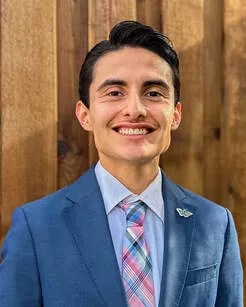
Gage Skidmore

Audio By Carbonatix
When Daniel Gallegos Banda began his college experience, he never dreamed of working with legal advocacy groups like Legal Aid D.C. in the nation’s capital. When Gallegos Banda started working full time after high school, higher education was for him an almost idealistic dream.
He started off by paying for community college courses, at around $200 each. He loved learning and was initially there for the self-improvement vibe that came with higher education, but that quickly changed. He soon enrolled in his first criminal justice course, which set him on the track to obtain his associates degree in criminal justice. Then, he enrolled at University of Texas at Dallas, where he became a fellow of the prestigious UT system Archer program in Washington, D.C.
“I am proud that today I am able to achieve things I would have never dreamed of,” Gallegos Banda told the Observer.
Gallegos Banda is one of the over 500,000 Deferred Action for Childhood Arrivals (DACA) recipients in the U.S., about 90,000 of whom live in Texas. DACA began in 2012 under President Barack Obama as an immigration policy that deferred the deportation of people who came to the U.S. without documentation as children: DACA allowed its recipients to receive legal work permits. The program has faced continuous legal challenges since 2017, when the first Donald Trump administration announced its goal to end this policy. Trump’s reelection likely serves as the death knell of the program.
Trump has vowed to utilize the military to conduct mass deportations of undocumented immigrants, and the Heritage Foundation’s Project 2025 guide outlines a process to phase out DACA for its 500,000 recipients by eliminating the staff time used to process their application renewals. The League of United Latin American Citizens says this would make it next to impossible for recipients to renew their status if staff simply aren’t available. No DACA means no legal work permit.
“I try not to think about it too much, but if I can’t continue working then I won’t ever be able to finish my education,” Gallegos Banda said.
DACA recipients are unable to receive most of the financial support or loans offered to college students because of their undocumented status; Gallegos Banda said that he does receive support from the state of Texas in the form of TASFA (Texas Application for State Financial Aid), but the money isn’t enough to cover his needs. To pursue his dreams, Gallegos Banda has had to work tirelessly while also attending his classes. He sees the work and debt he takes on now as an investment in the future contributions he could make, but the phasing out of DACA would make the already difficult application process simply nonexistent, and with that his academic goals and progress would be gone.

Daniel Gallegos Banda is a DACA recipient and student at UT Dallas.
Daniel Gallegos Banda
“A lot of younger dreamers don’t even consider applying for university because if they can’t legally work after graduation, then they would have just spent tens of thousands of dollars on a piece of paper they can’t even use,” Gallegos Banda said.
Advocacy groups say that hundreds of thousands of DACA dreamers would be removed from the U.S. workforce under the Trump presidency and Project 2025, with as many as 168,000 DACA-owned businesses at risk of disappearing.
Gallegos Banda said that people never even notice that he is undocumented or on DACA until he brings it up because his documentation status doesn’t affect how he acts or lets others treat him. He has the same dreams and aspirations as his peers, and seeks to give back to his community in any way he can by interning at Legal Aid D.C. and with the Mexican Embassy.
“I really want to make sure I can share the wealth of information I have been able to get with people who are in the place I was before college, people who thought education wasn’t meant for people like them,” Gallegos Banda said.
Anti-immigrant rhetoric has been all too common in Gallegos Banda’s opinion, and he emphasized that it wasn’t limited to Republicans; many Democrats have espoused right-wing stances on immigration.
“We saw just a fire hydrant of hate against immigrants coming not just from the Republicans but even the Democrats as well,” Gallegos Banda said. “Despite the hate, I think it is important to focus on building yourself up so that you can help others.”
Gallegos Banda said that his experience with the Archer program and Legal Aid D.C. has allowed him to work with some of the highest government offices in the U.S. while striving to offer important support to immigrants who would otherwise receive nothing in an increasingly unsupportive nation. He said he was hopeful because groups like the ACLU, LULAC, the National Immigration Center and others had banded together to support the Hispanic and immigrant communities that play such a major part culturally and economically in the U.S..
“My DACA status is a big part of who I am and it impacts so many things in my life, but I won’t let it define who I am,” Gallegos Banda said. “My immigration status doesn’t make me less human or less worthy of respect.”